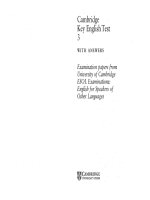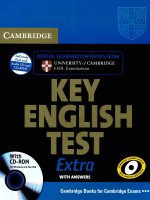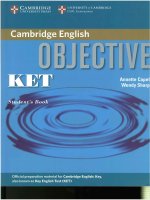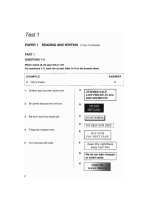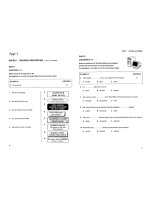001 cambridge KET extra book(2)
Bạn đang xem bản rút gọn của tài liệu. Xem và tải ngay bản đầy đủ của tài liệu tại đây (3.81 MB, 52 trang )
PAPER 1 Reading and Writing 1 hour 10 minutes)
Reading PART 1
Think about where you could see each notice
and who it is for.
Before you answer questions 1-5, read notices A
—H and think about where you could see them
and who they are for.
Notice A
1 Where could you see this notice?
a in a newspaper
b on a car
c beside a telephone
2 Who is it for?
a someone who wants to make a phone call
b someone who is a manager
c someone who wants a job in a garage
Notice B
1 Where could you see this notice?
a in a taxi
b on a road
c at a train station
2 Who is it for?
a train drivers
b people walking
c car drivers
Notice C
1 Where could you see this notice?
a in a sports centre
b in a clothes shop
c in a jeans factory
2 Who is it for?
a people trying on clothes
b people wearing jeans
c someone called Jane
Notice D
1 Where could you see this notice?
a in a house
b on a fridge
c in a cafe
40
I TEST 2 • PAPER 1 •
R ea di n g PART 1
2 Who is it for?
a a waiter
b a customer
c a cleaner
Notice E
1 Where could you see this notice?
a in a newspaper
b in a telephone book
c in a kitchen
2 Who is it for?
a someone who needs help
b someone who likes cooking
c someone who wants to help
Notice F
1 Where could you see this notice?
a at Cambridge station
b on a train
c in a newspaper
2 Who is it for?
a people going to Cambridge
b people from Stevenage
c people working on a train
Notice G
1 Where could you see this notice?
a on a new shirt
b in Saturday's newspaper
c in a shop window
2 Who is it for?
a people who wash clothes
b people who want their clothes cleaned
c people who want to buy clothes today
Notice H
1 Where could you see this notice?
a on a cook book
b on a restaurant menu
c on a noticeboard
2 Who is it for?
a people who want to learn to cook
b people learning Chinese
c cookery teachers
Now answer questions 1-5.
PART 1
QUE STI
ONS 1 -5
Which
notice (A
—H) says
this (15)?
For
question
s 1-5,
mark the
correct
letter A
—H on
your
answer
sheet.
Example:
0
0
Answer:
You can get something to eat here.
You can learn how to make different
kinds of food on this course.
A
O
A
Me
Ca
(C
B
Cambrid
ge
Station
taxi
drivers
only
Y
o
Jan
e's
Jea
ns
No
mor
e
en
ger
s
for
Ca
mb
in
rid
the
ge
cha
\
ngin
cha
g
ng
roo
e
m
at
Ste
ve
For kelp na
ge
Sta
teLepkoAttio
F
P
n
ass
than
3
pair
s
Clean
shirts in
24 hours
D
Halfprice
E
until
Saturda
y
G
You mustn't take too many clothes to try on.
H
Chinese and Thai
cooking lessons
TEST 2
• PAPER 1 •
Reading PART 1
41
Reading PART 2
ATM
Try to think of the word for each space before you
look at the words A—C.
Question 0
What did Sarah Packer do for the first time on
Monday?
Question 6
Read sentences 0 and 6-10 but don't look at the
words A, B or C below each sentence. Put your
hand over them so you can't see them. Think
about the meaning of each sentence.
Now read each sentence again.
What is the word in each gap (questions 0 and 610)? Choose from the list below.
a noun
a verb
an adjective an
adverb
Think about these questions but remember not to
look at the A, B or C options.
42
I T E S T 2 • PA P E R 1 • R e a d i n g PA RT 2
What is Sarah doing for four years at university?
Question 7
What did the university secretary do to all the new
students?
Question 8
What did Sarah and her new teachers do on the first
day?
Question 9
How does Sarah feel today?
Question 10
What is Sarah going to do next month?
Now answer questions 6-10.
PART 2
QUESTIONS 6-10
Read the sentences about a university student.
Choose the best word (A, B or C) for each space.
For questions 6-10, mark A, B or C on your answer sheet.
Example:
0
Sarah Packer......................to university for the first time on Monday.
A arrived
B went
C was
Answer:
6
0 A B C
o
m•
Sarah is doing a four-year.................... in Business Studies.
A class
7
B lesson
The university secretary was there to ................... all the new students.
A invite
8
B speak
C welcome
On the first day, Sarah.......................some of her new teachers.
A met
9
C course
B knew
C rememb ere d
Today, Sarah is..................... reading her business books.
A correct
B useful
C busy
10 Next month, Sarah is hoping to.............................the university swimming club.
A play
B join
C become
TEST 2
• PAPER 1 • Reading PART 2
43
Reading PART 3, Questions 11-15
Before you look at the A, B, C options,
read each sentence and think about
what you would say in each situation.
Before you look at questions 11-15, read the five
situations below and think about what you would
say.
1 You are at home, the phone rings and your
mother asks you to answer it. You don't want to
because you are busy.
2 Your friend asks you if you want to drink
lemonade or orange juice. You don't want either
and would prefer a different drink.
3 You are standing on a station platform waiting
for the 9.15 train to take you to college, like you
do every day. Someone tells you the train is late.
It has been late every day this week.
4 You are sitting at home with your friend from
school, doing your homework. She is having
problems with her homework and asks you for
help. You are having problems with it too.
5 You have just seen a play and are walking out
of a theatre with a friend. He says the play was
boring. You don't agree.
Now read questions 11-15 and choose the best
answer, A, B or C, for each one.
PART 3
QUESTIONS 11-15
Complete the five conversations.
For questions 11-15, mark A, B or C on your answer sheet.
Example:
Where do you
0
New y °viz)
come from?
School.
.
CC Home.
Answer:
11 Please answer the phone.
12 Would you prefer lemonade or orange juice?
13 The 9.15 train's late again.
14 Can you help me with my homework?
15 I thought the play was very boring.
44
TEST 2
• PAPER 1 •
Reading PART 3
A
How are you?
B
C
A
B
C
A
B
C
A
B
C
A
Why can't you?
When did he call?
Have you got anything else?
If you like.
Are you sure about that?
It was never there.
It often is.
Will it ever be?
I don't understand it.
It's not ready.
I can't help it.
Yes, I'd like to.
B
C
Which did you think?
I enjoyed it.
0
A B C
m•I
R e a d i n g PA RT 3 , Q u e st i o n s 1 6 - 2 0
Imagine you are the second speaker. Do not
read sentences A—H. Just read what the first
speaker says and think about what you reply.
To help you understand the conversation, read the
instructions and what Mrs Brown says. Think about
the questions below. Do not read sentences A—H.
1 Have Jack and Mrs Brown met before?
2 Why is Jack talking to Mrs Brown?
3 What does Mrs Brown ask Jack?
4 What do you think Jack asks Mrs Brown about
in spaces 17, 19 and 20?
5 What does Mrs Brown say is close to the house?
Now imagine that you are Jack and think about
what you would say in each of the spaces, 16-20.
Now read the sentences A—H and answer questions
16-20.
QUESTIONS 16-20
Complete the conversation about renting a room.
What does Jack say to Mrs Brown?
For questions 16-20, mark the correct letter A H on your answer sheet.
—
Example:
Mrs Brown: Good morning. Are you Jack Gomez?
Jack:
0..............................
Mrs Brown: Come this way. Here it is.
Jack:
16....................
Mrs Brown: And it's very warm. The rent is
£400 a month.
Jack:
17....................
Mrs Brown: There's nothing more to pay. Are you
a student?
Jack:
0
A
I=
B C D E
F
=I = = = o
G
H
i■ o
A What does the heating cost?
B
I can't decide about the room.
Can I phone you later?
C Can I use the kitchen and bathroom?
DHow near is the bus stop?
EI like the big window — it's nice and sunny. F
But is there anywhere to park my car?
18....................
Mrs Brown: It's very quiet here during the day.
And the station's not far away.
Jack:
Answer:
GYes, I've come about the room.
HA nurse, so I often have to work at night.
19....................
Mrs Brown: Only in the road. I haven't got a garage.
Jack:
20....................
Mrs Brown: All right. But before tomorrow.
TES T 2 • PAPER 1 • Re a di n g PA RT 3
45
Reading PART 4
when Chloe started playing the violin
Remember, the questions are in the same
order as the information in the article.
what Chloe says about her life
how Chloe feels about her teacher
Do this exercise before you answer questions 2127. The text tells us lots of things about Chloe and
her life. Here are 10 things that are in the text. Read
the text, then put the 10 things in the list below
into the same order as they are in the text. Put a
number in the boxes next to each line. The first
one has been done for you.
a film Chloe was in
her mum's job
1 where Chloe was born
someone who teaches Chloe
how old Chloe was when she played her first
concerts
information about Chloe's sister
her dad's job
Now you know where the information is in the
text, and what comes first and what comes next.
Questions 21-27 are in the same order as the
information in the text. So, the example will always
be about something at the very beginning and
question 27 will always be about something at the
end of the text.
Read questions 21-27 and underline the part
of the article where you find the information to
answer the questions.
Now answer questions 21-27.
PART 4
QUESTIONS 21-27
Read the article about a young girl who plays the violin.
Are sentences 21-27 'Right' (A) or 'Wrong' (B)?
If there is not enough information to answer 'Right' (A) or 'Wrong' (B), choose
'Doesn't say' (C). For questions 21-27, mark A, B or C on your answer sheet.
Chloe Hanslip
Chloe was born in England. Her father works with computers and her mother teaches
dance. Chloe began playing the violin when she was two. Her parents bought her a
special violin which was small enough for her to use, and, even at this age, she could
play without help. Her sister Virginia, who was nineteen at the time, played the piano
and, after Chloe heard her play something, she tried to play it on her violin. From
the age of four, she played at a number of concerts in Britain and America and in
1999 she was a child violinist in the Hollywood film Onegin.
Many teachers offered to give Chloe lessons but when she was seven she met
Professor Zakhar Bron. She was certain from the beginning that he was the right teacher for her. His work
takes him around the world and each year Chloe flies thousands of kilometres to get to his classes.
Chloe was only fourteen when she made her first CD, but she says she is just like any other teenager.
'I have lots of friends and I love pop music. Getting better on the violin is important, but I also make sure
I have time for other things.'
46
TEST 2
• PAPER 1 •
Reading PART 4
A
Example:
0
Chloe's mother gives dance classes.
A Right
B
Wrong
Answer:
C Doesn't say
0
A
B
B Wrong
21
= o
■
Chloe's first violin was the same size as other violins. A Right
C
C Doesn't say
22 To start with, Chloe practised the same music as her sister.
A Right
B Wrong
C Doesn't say
23 Chloe prefers playing concerts in America to playing in Britain. A Right
B Wrong
24 When Chloe first met Zakhar Bron, she knew she wanted to study with him. A Right
C Doesn't say
B Wrong
C
Doesn't say
25 Chloe travels to other countries for her lessons with Zakhar Bron. A Right
B Wrong
C Doesn't
say
26 Chloe thinks she has a different life from other people her age. A Right
B Wrong
C Doesn't say
27 Chloe plays pop music on the violin for her friends.
A Right
B Wrong
C Doesn't say
TEST 2
• PAPER 1 •
Reading PART 4
I 47
Reading PART 5
Ask some simple questions about the text to help
you understand it.
Read the article and try to answer these questions.
1 What is the article about? Is it about a person, an
animal or a place?
2 Is the title of the article singular or plural?
3 What tense are most of the verbs in this text?
Now answer questions 28-35. The points below
may help you.
Question 28
The word needs to go with the plural noun
`animals'.
Question 29
This part of a verb comes after the modal 'can'.
Question 30
4 Does the text tell a story or does it give
information?
5 Can you see any conjunctions (these are words
like: 'and', 'because', 'but', `if, `so', 'or', 'while') in
the text? Put a circle around the conjunctions in
the text.
Now look at the verbs in these phrases from the
text.
`badgers are' 'have ... seen'
`are lots of ' 'word for badger was'
This is about something happening over a long time
(`centuries'), not a date in the past.
Question 31
This is about a single point in time in the past,
`250,000 years ago'.
Question 32
This part of the verb comes after 'have' to make the
present perfect tense.
Question 33
This is talking about a general fact.
`have been' 'are very old' 'have ... found'
Decide what tense they are in and put them in the
right box in the table below.
presen
t
perfec
48
I TEST 2
past
• PAPER 1 •
presen
t
Reading PART
5
Question 34
Read the whole sentence. The word must go with the
phrase 'but in others'.
Question 35
This is in the present tense and must go with
`badgers'.
PART 5
QUESTIO
NS 28-35
Read the
article
about
badgers.
Choose
the best
word (A,
B or C) for
each
space.
For
questions
28-35,
mark A, B
or C on
your
answer
sheet.
'4•%
•e-._
•
Badg
ers
Not many
people
have (0)......................................
seen a
badger.
(28) .........................................
black and
white
animals
can
sometimes
(29)........................................................................... the
size of a
large dog.
They live
in
undergrou
nd holes in
woods and
forests in
Europe
and many
of their
homes
have been
there (30)
.......................................................................... centuries.
Scientist
s have
even
found
bones of
badgers
(31)...............
250,000
years
ago.
The old
English
word for
a
badger
was
'brock'
and a
few
English
villages,
for
example
Brocken
hurst
and
Brockley
, have
(32)................
that
name.
(33)...............
are lots of
children's
books
about
badgers. In
(34)...............
stories
badgers
are very
old and
clever, but
in others
they're not
nice at all.
Certainly,
badgers
are not
very
friendly
TEST 2
• PAPER 1 •
Rea di n g PART 5 49
and only
(35) out
at night.
They live
on insects
and small
animals,
but also
eat young
plants and
eggs.
Example:
0
A ever
B
still
C
soon
28
A That
B
This
C
These
29
A being
B
be
C
been
30
A for
B
since
C
during
31
A after
B
from
C
at
32
A keeping
B
keep
C
kept
33
A Here
B
There
C
They
34
A some
B
any
C
every
35
A came
B
come
C
comes
Writing PA RT 6
Count how many letters are needed for each
word — this can help you with spelling.
For the example, the two extra letters are C and E.
Now answer questions 36-40 in the same way.
Question 36
AIBYLRREI
Read each of the sentences, 0 and 36-40.
1 How many letters are there in each of the six
words about places in a town?
2 Will any of the words you write need an extra `s'
on the end of the word because they are plural?
Now look at the example.
Here are all six letters you need to spell the word,
but there are two extra letters you must not use.
ACKMRETE
As you write the correct answer, cross out the
letters you use.
Question 37
MZSMUSEU
Question 38
NSRETUETSARA
Question 39
GEOLCDSLE
Question 40
E T H S A RTA E
PART 6
QUESTIONS 36-40
Read the descriptions of some places in a town.
What is the word for each one?
The first letter is already there. There is one space for each other letter in
the word. For questions 36-40, write the words on your answer sheet.
Example:
0
m----------
You can buy all your vegetables here.
Answer:
36 You can read books here and take them home too,
0
vvot
rlzet
I --------------
if you have a special card.
37 In this building, you can look at interesting old things.
m----------
38
r-------------------
If you don't want to eat at home, you can buy a
meal here.
39 Students are taught in classrooms here.
c-------------
40 You buy a ticket to watch a play here.
t-------------
TEST 2
• PAPER 1 •
Writing PART 6
51
Writing PART 7
Think about what kind of word is needed in each
space.
This is the 'going to' future and it needs to fit with
`Mum and Dad'.
Before you read the text, practise finding verbs,
prepositions, pronouns, conjunctions and articles.
Question 43
This is a preposition that goes with 'take'.
Read this short text and put a box
around the verbs, a straight line under the
Question 44
This is a pronoun that refers back to 'Hannah'.
prepositions, a vkDdille under the pronouns, a
circl) around the conjunctions, and a
triangle
around the articles.
Polly walked into a shoe shop and looked at
the shoes. She really liked the red ones but they
were too small. She asked the shop assistant to
get a bigger pair. The shop assistant climbed up
to the top shelf and got the bigger size. He gave
them to Polly and she tried them on. They were
beautiful and just right.
Now, read Barbara's letter to her friend Kate and
think about what kind of word will go in each
space. Here are some points to help you.
Example
This verb form comes after 'will' to talk about the
future.
Question 41
This is a preposition that comes before a date.
Question 42
Question 45
This is a conjunction that means 'plus'.
Question 46
This is a modal verb that goes with 'to' plus another
verb.
Question 47
This is a verb that means something you do with
`food'.
Question 48
This is a conjunction you use to talk about things
that 'may' happen.
Question 49
This is a preposition that tells you where something
happens.
Question 50
This is a verb that means 'to wish something for the
future'.
Now answer questions 41-50.
■1111
52
I TEST 2 • PAPER 1 •
Writing PART 7
PART 7
QUESTIO
NS 41-50
0
be
Complete
the
letter.
Write
ONE
word for
each
space.
For
question
s 41-50,
write the
words on
your
answer
sheet.
Example:
TEST 2
• PAPER 1 •
Writing PART 7
53
Dear Kate,
It will (0) ................ my 14th birthday (41).............
Dad (42).............going to take me to the beach. We'
can take four friends (43)..................me.
Would you like to come? Hannah has said (44) ..........
asking David, Maria (45)..................you. Mum will take
don't (46)...............to bring anything to (47)...........
(48)................the weather is good, we may swim (49
sea so remember to bring your swimming things.
I really (50)................you can come.
Love,
Barbara
Writing PART 8
Underline all the important information that you
need to fill out the form or notes. Think about
what you need to write for your answers: a
word or a number.
First, look at David's notes about a shopping trip.
Underline the important words in his notes at the
bottom of the page.
Now look at the advertisement and the email and
underline this information:
1 all the shop names
2 all the cities
3 all the dates
4 all the places where they can meet
5 all the a.m. times
6 all the prices
54
I TEST 2
• PAPER 1 •
Writing PART 8
Now that you have all the possible answers, you
need to decide which one is correct. Let's look at
question 51 together. There are three cities in the
advertisement because Cresswell's has shops in all
three cities. But if you look at Robert's email you
can see that Robert and David are going to go to
London. So 'London' is the answer to question 51.
Now answer questions 52-55.
PART 8
QUESTIONS 51-55
Read the advertisement and the email.
Fill in the information in David's notes.
For questions 51-55, write the information on your
answer sheet.
CRESSWELL'S
DEPARTMENT STORE
TO:
David
Robert
I know you wanted to buy a computer so let's go to Cresswell's
on the first day of the sale. Computers are £300 cheaper at
5 — 10 January
the moment. There's a train to London at 7.10 a.m. Wait for me
Computers £550
at the bus stop at 6.30 a.m. and we'll walk to the station
together.
— were £850!
David's Notes - Shopping
Trip
CressweLL's
Name of shop:
In which city:
51
Date of trip:
52
Where to meet Robert:
53
Train leaves at:
54
Cost of computer:
55
TEST 2
• PAPER 1 •
Writing PART 8
55
Writing PART 9
Make some notes before you write your
answer. Always check your answer before you
copy it onto the answer sheet.
Read Marie's note below.
DeCir Anin,C1,
I have
Some Part 9 tasks do not have a message or note for
you to read, they just have instructions, like the task
on page 57.
Left at boor koksee viku coat. It Ls verb
Lhkportaht because was preset from vvt.
mother. I thi.vus I Left the coat
UOV.Y hall,.
Love, marLe
.
Answer these questions.
1 What did you leave at your friend's house?
2 Why is this thing important to you?
3 Where in your friend's house did you leave it?
Marie gives all the information the task asks for:
what she left, why it is important and where in the
house it is. Marie got full marks for this note.
When you have an answer to each of these
questions, you are ready to write your note to your
friend.
There are some mistakes in Marie's note. Some of
the words are in the wrong order, there are two
words missing and there are two spelling mistakes.
Use the question paper to first make some notes
and write your answer.
You then need to check your answer. Look at the
grammar and spelling and make sure everything is
correct before you copy your answer onto the
answer sheet.
Can you find them?
Rewrite Marie's note so there are no mistakes.
56 I TEST 2
• PAPER 1 •
Writing PART 9
PART 9
QUESTION 56
Last night you were at a friend's house. You think you left something important there. Write a
note to your friend.
Say:
what you have left
why it is important
where in the house you think it is. Write 25-35 words. Write the note on your answer sheet.
TEST 2
• PAPER 1 •
Writing PART 9
57


